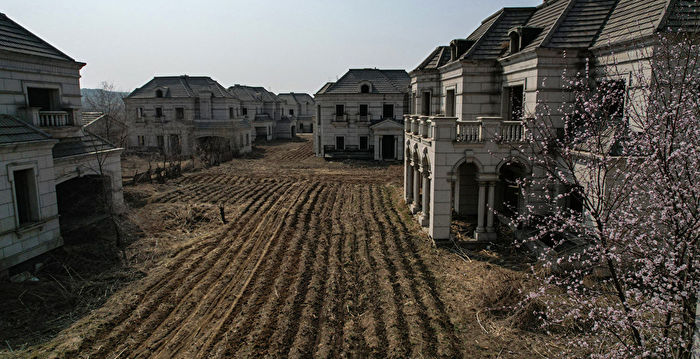[The Epoch Times, November 17, 2023](Epoch Times reporters Cheng Jing and Yi Ru interviewed and reported) Nomura Securities estimates that there are about 20 million uncompleted pre-sale buildings in China, which has attracted attention. Experts analyze that this will have a huge impact on society and the economy, and the CCP’s approach is “really slow and slow.” No matter how much resources are invested, the effect may be very limited and cannot prevent the collapse of the real estate market.
Are the 20 million pre-sale units unfinished? The CCP’s Measures Are Accused of “Chronic Delay”
Nomura Securities recently released a report stating that the area of unfinished pre-sale housing in China is astonishingly large, “equivalent to about 20 times that of Country Garden, China’s largest private real estate developer (calculated by sales area).”
Lu Ting, the agency’s chief China economist, pointed out that “it is estimated that there are about 20 million unfinished pre-sale buildings in China.” It would cost approximately RMB 3.2 trillion to complete the construction of these houses.
American economist David Huang recently analyzed for The Epoch Times that the 20 million unfinished pre-sale buildings are not necessarily unfinished buildings. They have not been sold or have not been completed after being sold, or have not been delivered after the pre-sale certificate has been processed. But a considerable part of it is due to lack of funds, or the current market is unable to complete transactions.
“This is of course a warning.” Taiwanese financial expert Huang Shicong recently analyzed to The Epoch Times that if 20 million apartments cannot be completed, I am afraid it will have a huge impact on society and the economy. This is a huge amount. A while ago, Beijing hoped that Companies like Country Garden or Evergrande can at least guarantee the delivery of the property.
“But it seems that the two largest companies cannot afford it financially, let alone the other second- and third-tier real estate developers.”
However, Huang Shicong believes that in fact, so far, China’s real estate market has probably not seen its worst yet. According to foreign experience, it will probably take at least three to five years to be revised down, and it may take as long as ten years. The adjustment process depends on the speed of housing decomposition.
Recently, some people in the Chinese industry posted articles online, pointing out that housing prices in Shenzhen have collapsed like a stampede. Among them, commodity housing prices in the central area of Baoan District fell from more than 4.2 million (RMB, the same below) to 1.85 million, a plunge of more than 55%. In other areas, the decline was mostly around 40%.
Huang Shicong said, “You can allow housing prices to fall, so that the depuration rate will be faster. But the problem in China is that it does not allow housing prices to fall too fast. Therefore, I can only describe it as a chronic delay. As for what will happen? I’m afraid no one knows when Ling will be late.”
Can the CCP’s “three major projects” save the market?
Previously, Bloomberg quoted news as saying that the central bank will launch a specific implementation plan for the “three major projects” as soon as this month, and will inject at least one trillion yuan (RMB, the same below) into policy banks in stages through mortgage supplementary loans (PSL) and special loans. ) low-interest funds to stabilize the sluggish real estate market.
The so-called “three major projects” include affordable housing, urban village renovation and emergency and emergency infrastructure.
As early as nearly a decade ago, Beijing used PSL tools to carry out the so-called “shanty town renovation” plan from 2014 to 2019, which successfully reversed the real estate downturn and restored economic growth, but it also promoted the soaring of housing prices.
But things are different now. “Because the current supply of real estate exceeds demand,” David Huang analyzed that if all this trillion was used to build low-rent housing, urban village renovation and public facilities, it would not be that effective.
David Huang believes that “the funds should be used to acquire some developers, or help developers complete unfinished buildings. Or give people discounts for buying houses, and use monetization to subsidize people to buy and rent houses, instead of building houses, because they have already There is an oversupply.
“So if you want to use this old method to build affordable housing and renovate urban villages, I think the effect will be unsatisfactory. The construction of public facilities for “both leisure and emergency use” has always been needed, but China’s sewers and rainwater pipes have not yet been completed, but there are With the largest number of high-speed rails in the world, infrastructure construction should give more consideration to the national economy and people’s livelihood, rather than just political good looks.”
Beijing continues to “rescue the market”, but the real estate crisis remains unresolved
China has introduced many policies to rescue the housing market this year, including lowering reserve requirements and interest rates, hoping to release more funds to stabilize the market. However, Huang Shicong believes that “obviously the scale of this fund is not large enough.”
“The amount involved, just for 20 million houses alone, is several trillion yuan, and the potential black hole of China’s real estate should be at least more than ten trillion yuan. Is this a problem that can be solved by investing one or two trillion yuan?”
Wang Wangochen, an assistant researcher at the China Economic Research Institute, also recently analyzed the Epoch Times, “Beijing needs to spend more than just the conservative 3.2 trillion yuan mentioned by Lu Ting. I estimate that it will take at least 10 trillion yuan or more to dispel the current situation.” The builder’s debt, but from the suspension of Evergrande in 2021 to now, it should know how to solve it, but there is no way to solve it. “
On the other hand, Wang Guochen said, “If we really have to spend 10 trillion yuan to save builders, another public complaint will arise, that is, taxpayers’ money will be used to save those wealthy builders, and the gap between the rich and the poor will be related to relative deprivation.” There are solutions to the problem, but it’s difficult to actually implement them.”
“The other way is to simply let these builders go bankrupt, but then there will be what Lu Ting said, how to deal with 20 million units of unfinished buildings, so it doesn’t dare to let the builders go bankrupt, and there really is no money to come up with. Bail out the market.”
Last year, large-scale “supply cutoffs” occurred in many places. Desperate buyers of pre-sale homes have decided to stop making monthly payments no matter what the cost; while many developers are running into debt crises, making it increasingly difficult to complete construction of pre-sale homes.
Huang Shicong believes that the official measures are only to delay the pressure of rapid collapse. As for turning around and making the entire real estate industry go up, it is basically impossible.
He believes that if China’s real estate is to turn around, it needs to make a big breakthrough, allowing housing prices to fall significantly, and then after the entire transaction volume comes out, the money that was originally trapped can be rolled out. This may be the beginning of solving the real estate problem.
“But this will have a huge impact on the economy. There may be a financial tsunami similar to the US financial tsunami in 2008 and 2009, and the direct impact on the economy will be huge. Beijing is obviously not taking this path.”
“There is no real estate on such a scale as that in China in the history of mankind, but I think it is really slow and slow if this continues. No matter how much resources the government invests, the effect will be very limited.”
The real estate industry is collapsing, endangering social stability
Data released by the National Bureau of Statistics of the Communist Party of China on Wednesday showed that investment in real estate development fell by 9.3% in the first 10 months of 2023, while it fell by 9.1% from January to September. Residential real estate sales fell by 3.7% from January to October, a greater decline than the 3.2% decline in the first nine months of this year.
Although the CCP’s statistics are often questioned for “embellishing”, Wang Guochen believes that “this at least shows a trend. Real estate is still in a decadent state. In fact, it was already in recession last year, and it is still continuing to decline now, which means that the situation is really It’s very serious.”
“Of course, another figure it did not disclose includes the decline in land auctions and land acquisition by builders. So, going back to the whole issue, I think if Beijing does not really solve the real estate debt problem, The situation will only get worse.”
Previously, China issued more than 1 trillion treasury bonds. In October this year, 24 provinces in China issued a total of more than 1.1 trillion yuan in special refinancing bonds. This money is mainly used to repay existing local debts.
Wang Guochen believes that China’s debt should basically not cause financial risks, because the overall debt ratio is relatively low internationally. But the problem is that it has issued so much debt, which brings us back to the original question, does it have any Used to pay back debts to builders and deal with unfinished buildings?
“If its money is only used to build urban villages, there is no way to improve the current problems, so no matter how much money it spends, it will not be able to solve it. The most important problems in China’s economy now are unfinished real estate buildings and debt defaults. The problem.”
Nomura’s report said that China’s real estate industry is collapsing, developers are generally facing a serious credit crisis, and home buyers are becoming increasingly impatient with the continuous delays in the delivery date of the houses they purchase. It is predicted that sometime next year, the problem of delayed housing delivery will become a social problem and endanger social stability.
Real estate, which accounts for about 20% of China’s gross domestic product, continues to be sluggish, seriously dragging down China’s overall economy.
Wang Guochen said that the economy has been idling in the past few years, and the ability to repay money has also been reduced. It has been almost three years since Evergrande has accumulated more and more debts. If it is not resolved next year, the entire Chinese economy may suffer a systemic crisis. risk.
David Huang said that these measures are still not strong enough, and the scale is not enough. The key is that the stimulus measures are not to pour more funds into the hands of consumers and ordinary people, but to invest in infrastructure construction for state-owned enterprises and central enterprises. This is useless and cannot be stopped. The collapse of the housing market.
Editor in charge: Li Yuan#
2023-11-19 03:55:59
#million #presale #units #unfinishedExpert #CCPs #bailout #ineffective #Epoch #Times


